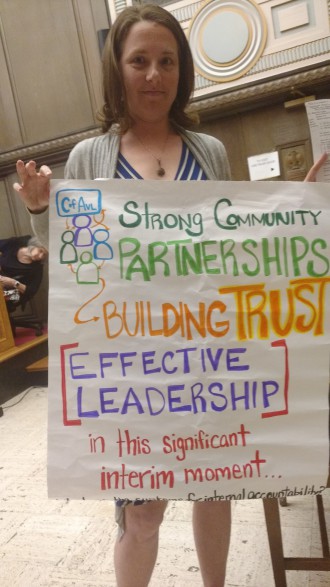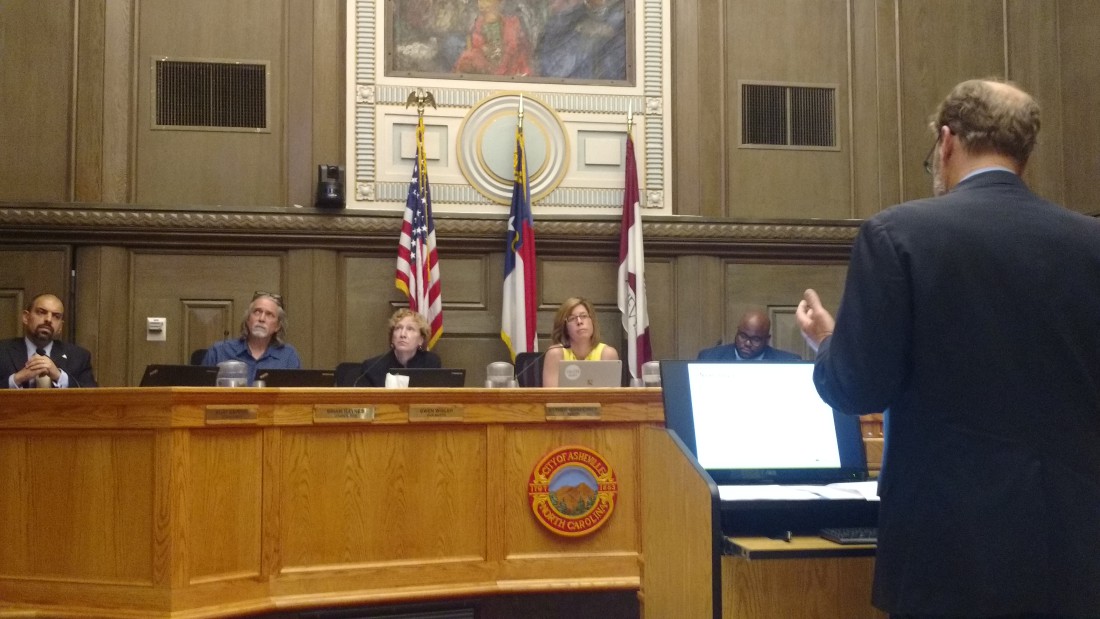The Rev. Amy Cantrell, founder of the intentional community and homeless support nonprofit BeLoved Asheville, left strong words hanging in Council chambers as public comment drew to a close at Asheville City Council’s May 15 meeting. “The soul of our city has been laid bare and found wanting,” she proclaimed. “We are in a crisis.”
Cantrell’s remarks came as she criticized the inclusion of additional funding for the Asheville Police Department in the city’s proposed budget for fiscal year 2018-19, one of the many police-related issues that dominated discussion at the meeting. Nearly three months after the leak of body camera footage showing white former APD officer Chris Hickman beating black Asheville resident Johnnie Jermaine Rush after a stop for alleged jaywalking, both residents and Council members continued their calls for changes to policing in Asheville.
The most immediate result of this dialogue was Council’s decision not to dissolve the Citizen’s Police Advisory Committee. As part of the meeting’s new business, Sarah Terwilliger, deputy city clerk, presented a staff report recommending that Council eliminate CPAC due to redundancy with the newly forming Human Relations Commission. She also referencedAPD’s efforts to better engage with residents, including its new community liaison program and regular neighborhood meeting attendance.
After Council member Keith Young moved to dissolve CPAC and Brian Haynes seconded, Sheneika Smith urged her colleagues to rethink their decision. “I believe that, in theory, the HRC is going to take up these community concerns, and I believe that in its new formation, that is a bad idea,” she said. “I believe that CPAC should stay in place to be an intermediary committee to hear public safety concerns.”

Smith argued that given the present tenor of the community, the HRC would be overwhelmed with public safety issues and thus unable to fulfill its broader mandate of ensuring racial equity and eliminating discrimination across the city. She added that in its current incarnation, CPAC hadn’t fully realized the duties and responsibilities laid out in its founding resolution. “From 1991, I’m reading the function of CPAC, and I’ve never seen them operate at this potential.”
The community comment that followed was unanimous in its support for keeping CPAC. Carmen Ramos-Kennedy, president of the Asheville-Buncombe NAACP, suggested that based on her own experience with city committees, the HRC would need at least a year to become fully operational. Resident Ashley Cooper agreed that CPAC should stay in place to cover the transition, while Sabrah n’haRaven suggested the group be rolled under the HRC as a subcommittee specifically devoted to policing concerns.
Rondell Lance, president of the Fraternal Order of Police in Asheville and recent candidate for Buncombe County sheriff, also lent his voice to preserving the committee. “I’ve gone to those meetings and met people who may be on opposite ends of thought, but we talk,” he said. “There’s a lot of people here in the audience tonight that, without CPAC, I would’ve never met and would’ve never had a conversation with.”
Growing teeth
After public comment, Young withdrew his motion, adding that the city’s Boards and Commissions Committee might be able to refine CPAC’s scope and role over the transition to the HRC. However, Council still plans to eventually replace the group: In an announcement not listed on the meeting’s public agenda, Mayor Esther Manheimer said that the city would be suggesting legislation at the state level to establish what she called “a CPAC that has the teeth that the community is concerned about.”
If this legislation passed, Manheimer explained, the new citizen review committee would have powers to submit binding decisions, issue subpoenas, review personnel records and watch body camera footage, the latter under a confidentiality agreement. She said the proposed bill would apply to Asheville specifically but was modeled after the broader House Bill 165, which failed to pass after being introduced in the last legislative session.
While Young applauded the city’s effort to move forward on police oversight with the help of the General Assembly, Council member Vijay Kapoor expressed grave concern over the process. “This is the first time I’m seeing this. I want to be collegial here, but these are significant legislative priorities, and as a Council member, this wasn’t even on the agenda,” he said. “I understand there’s timelines, but this could have been shared with us before.”
Smith agreed, noting that the lack of advance notice on the legislation was not an isolated incident. “There have been a couple of times this year where we really haven’t been clued in on things before we’ve had to make a decision,” she said. “As a new Council member, I would like to sit with things a lot longer so I can ask the appropriate questions to constituents and have time to figure out things early.”
Manheimer said that the legislation would be put on the agenda for discussion at Council’s next meeting on Tuesday, May 22, but recent City Council candidate and community advocate Dee Williams added her thoughts during the evening’s public comment. She criticized Council for urging action at the state level before making local changes such as written authorization for consent-based searches during traffic stops, which she had suggested as part of the NAACP’s Criminal Justice Reform Committee. “Don’t go down to Raleigh; we need to start right here,” Williams said.
In another item not included on the agenda, interim City Manager Cathy Ball announced that the city had hired Chicago-based consultancy 21st Century Policing LLC to review the Rush beating and its subsequent investigation. Consultant Sean Smoot said his group would be in the city throughout the week to examine APD’s professional standards, policies and other aspects.
Delayed gratification
As part of its unfinished business, Council heard a report from staff concerning the city’s progress on making APD information available as open data. Council had ordered the review in response to a petition at its April 24 meeting by civic technology advocacy group Code for Asheville, presented by volunteer Patrick Conant.
Jaime Matthews, assistant to the city manager, and Scott Barnwell, business and public technology manager, walked Council through the current status of the request. They explained that some data, such as crime reports and the APD manual, would be released soon, while other data sets, particularly citizen complaints and use-of-force information, would require additional staff review.
As soon as the presentation ended, Council began expressing its frustration at the speed of the release. “I thought this was going to move a lot faster — I was hoping we’d be addressing these things and voting on them within a month,” said Haynes. Manheimer and Young echoed his remarks, garnering a cacophony of approving snaps from members of the audience.
When asked about staff’s specific issues about releasing the data, Barnwell said that the technical side of the equation was relatively uncomplicated. “The question is really with the Police Department and their concerns,” he said. In public comment on the report, Conant countered that staff should be documenting its concerns in writing to give better transparency to the process. He also called for specific timelines and additional Council involvement in the decisions over what information to release.
In response to criticism from both Council and the public, Ball defended her staff’s efforts, saying she didn’t have the manpower available for personnel to work on open data concerns full time. “We have to do this responsibly so we don’t end up getting sued, we don’t end up having issues,” she said. “I know that’s not popular; I know that there’s not fingers to clap. I understand that, and I’m OK with that.”
Manheimer called for staff to present more details at Council’s June 19 meeting, but it was Smith who closed comment on the issue. “The message is this: We’re in a crisis here in our city concerning public safety,” she said. “If there were a crisis in any area of our city that really impeded our economic success, we would put all of our eggs in a basket.”




Not if they’re going to let out the door then VANDuncan’s High school principal speech influence them